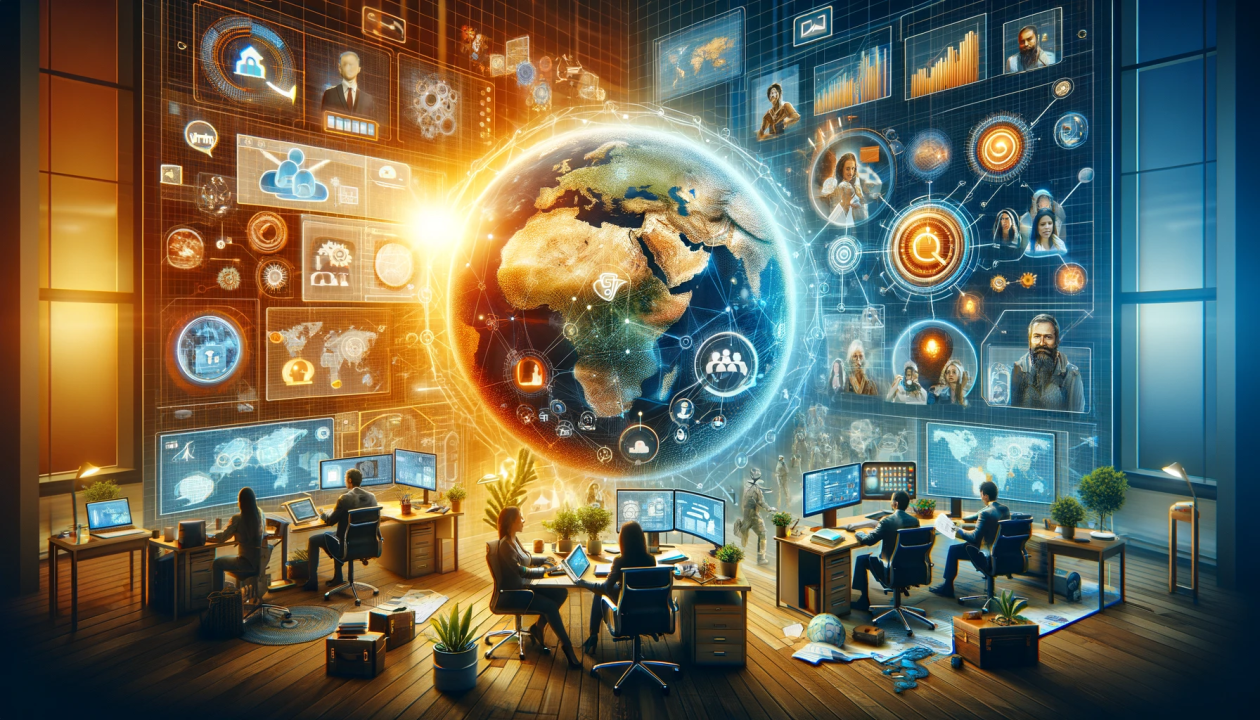The Rise of the Digital Economy: Transforming Industries and Creating New Opportunities

The digital economy is rapidly changing the way we work, shop, communicate, and live. Enabled by technologies such as the internet, cloud computing, artificial intelligence (AI), and blockchain, the digital economy encompasses any economic activity driven by online and digital technologies. It is transforming traditional industries, creating new markets, and offering unprecedented opportunities for growth and innovation. However, it also brings challenges that require strategic approaches to address inequality, cybersecurity, and regulatory concerns. This article explores the foundations of the digital economy, its impact on industries, the opportunities and challenges it brings, and its implications for future economic growth.
What is the Digital Economy?
The digital economy can be defined as economic activity that results from billions of online connections among people, businesses, devices, data, and processes. According to the Organisation for Economic Co-operation and Development (OECD), it includes e-commerce, online services, and digital platforms, as well as the “Internet of Things” (IoT), digital payments, and cloud-based infrastructure.
In a digital economy, value is often generated by data and information flows. Companies that can efficiently collect, analyze, and utilize data gain a competitive advantage. This shift from traditional resource-based value to data-based value has transformed companies like Amazon, Google, and Alibaba into global powerhouses, reshaping the dynamics of the global economy.
Key Drivers of the Digital Economy
Several key factors have fueled the rapid growth of the digital economy, from technological advances to changing consumer expectations.
1. Technological Innovation
Advances in technology, especially in fields such as artificial intelligence, machine learning, and cloud computing, have made it easier and cheaper to store, analyze, and leverage data. Cloud services provide scalable infrastructure, allowing companies of all sizes to access high-level computational power. AI, meanwhile, enables businesses to automate tasks, improve decision-making, and provide personalized experiences to customers.
2. Increased Internet and Mobile Access
The widespread availability of high-speed internet and mobile devices has brought the digital economy to more people than ever before. According to Statista, there were approximately 5.16 billion internet users globally as of 2023, representing about 65% of the world’s population. This connectivity has made it possible for people from all walks of life to participate in the digital economy, whether by working remotely, purchasing goods online, or using digital financial services.
3. Shift in Consumer Behavior
Consumer expectations are shifting toward convenience, immediacy, and personalization, all of which are enhanced by digital technologies. Online shopping, streaming services, and on-demand food delivery are just a few examples of how consumers have integrated digital services into their daily lives. This shift has encouraged traditional businesses to adopt digital strategies to remain competitive.
4. Government and Policy Support
Governments worldwide are supporting the development of digital economies through investment, innovation policies, and regulatory frameworks. For example, the European Union’s Digital Strategy aims to make Europe a global leader in the digital economy by investing in AI, cybersecurity, and data infrastructure. Similarly, countries like China and India are building infrastructure to support digital payments and e-commerce, helping small businesses go online and reach a global audience.
Impact of the Digital Economy on Key Sectors
The digital economy has reshaped numerous industries, creating opportunities for growth and innovation across a wide range of sectors.
1. E-commerce and Retail
The e-commerce industry has been one of the biggest beneficiaries of the digital economy. Companies like Amazon, Alibaba, and Shopify have revolutionized how people shop, making it possible to buy goods and services from anywhere in the world with a few clicks. The COVID-19 pandemic accelerated this trend, as lockdowns forced many consumers to turn to online shopping. This shift is expected to continue, with global e-commerce sales projected to reach over $7 trillion by 2025.
2. Finance and Banking
The financial sector has also experienced significant changes, with the rise of fintech companies offering digital financial services such as mobile payments, peer-to-peer lending, and digital wallets. Innovations like blockchain and cryptocurrencies are challenging traditional banking models, providing faster and more efficient ways to transfer money, make investments, and store value. Moreover, digital banking has improved financial inclusion by providing services to unbanked populations in remote or underserved areas.
3. Media and Entertainment
Digital platforms like Netflix, Spotify, and YouTube have disrupted the media and entertainment industry by providing on-demand access to content. Consumers now have more options than ever before and can tailor their media consumption to their personal preferences. These platforms rely on data analytics to understand viewer preferences and suggest content, creating highly personalized experiences that keep users engaged.
4. Education and Healthcare
The digital economy has also impacted education and healthcare, enabling remote services and improving accessibility. E-learning platforms such as Coursera, Khan Academy, and edX allow students to access high-quality education from anywhere in the world. In healthcare, telemedicine services enable patients to consult with doctors remotely, reducing the need for physical visits. Additionally, digital health records and AI-powered diagnostics are improving healthcare delivery and patient outcomes.
Opportunities in the Digital Economy
The digital economy offers several opportunities for economic growth, innovation, and job creation.
1. Job Creation in New Industries
The digital economy has created a demand for new types of jobs, from software developers and data analysts to digital marketers and cybersecurity experts. According to the World Economic Forum, the rapid adoption of digital technologies could create 97 million new jobs globally by 2025. This shift offers significant opportunities for people to enter high-paying and flexible jobs in fields that didn’t exist a decade ago.
2. Small Business Growth and Global Reach
Digital platforms like Shopify, Etsy, and Amazon enable small businesses to reach a global audience. With access to online marketplaces, small businesses can sell their products and services internationally, breaking down barriers that once limited growth to local markets. Social media platforms also provide affordable marketing channels that help small businesses build brand awareness and engage with customers directly.
3. Economic Inclusion and Access
Digital finance and e-commerce provide access to economic opportunities for people who are traditionally excluded from the financial system, such as those in rural areas or low-income populations. Digital payments and mobile banking, for example, have made it possible for millions of people in developing countries to participate in the economy, make payments, and save money. In this way, the digital economy can contribute to reducing economic inequality.
4. Innovation and Efficiency
Digital technologies enable businesses to innovate rapidly and operate more efficiently. For example, data analytics allows companies to make data-driven decisions, leading to better outcomes and more efficient use of resources. Automation and AI help businesses streamline operations and reduce labor costs, enabling them to invest more in innovation and growth. Moreover, digital technologies foster collaboration and knowledge-sharing across borders, driving global innovation.
Challenges in the Digital Economy
Despite its many benefits, the digital economy presents several challenges that need to be addressed for it to reach its full potential.
1. Cybersecurity and Privacy Concerns
The digital economy relies heavily on data, which makes cybersecurity and data privacy major concerns. Cyber attacks can result in significant financial losses, damage to reputation, and breaches of personal information. Businesses and governments must invest in cybersecurity measures to protect sensitive information and maintain consumer trust. Regulations like the European Union’s General Data Protection Regulation (GDPR) aim to protect user data, but cybersecurity remains a complex and evolving issue.
2. Digital Inequality
Not everyone has equal access to the digital economy, which can exacerbate economic inequality. Factors such as lack of internet access, digital literacy, and affordable devices can limit people’s ability to participate in the digital economy. Bridging the digital divide requires investment in infrastructure, digital literacy programs, and affordable technology to ensure that everyone can benefit from digital opportunities.
3. Market Concentration and Monopoly Power
The digital economy has led to market concentration, with a few large companies dominating sectors like social media, e-commerce, and digital advertising. This concentration of power raises concerns about competition, innovation, and consumer choice. Regulators in various countries are investigating antitrust actions to address monopoly power in the tech industry and promote fair competition.
4. Workforce Disruption and Skill Gaps
Automation and AI are changing the nature of work, potentially displacing jobs in traditional sectors such as manufacturing, retail, and logistics. While the digital economy creates new jobs, there is often a gap between the skills required for these jobs and the skills available in the workforce. Addressing this issue requires investment in education and training programs that equip workers with digital skills and prepare them for the jobs of the future.
The Future of the Digital Economy
The digital economy is expected to continue growing, reshaping industries, and driving economic growth. Emerging technologies such as 5G, AI, and the metaverse will further enhance digital experiences and create new business opportunities. However, the path forward requires collaboration between governments, businesses, and communities to address challenges such as cybersecurity, digital inequality, and workforce disruption.
Governments will play a crucial role in shaping the digital economy by establishing policies that promote innovation, protect consumer rights, and ensure fair competition. Businesses, meanwhile, must adopt responsible practices to protect user data, create sustainable business models, and invest in upskilling their workforce.
For individuals, adapting to the digital economy means embracing lifelong learning and staying informed about emerging technologies. Building digital literacy and technical skills will be essential for future success, as digital transformation touches every aspect of society.
Conclusion
The digital economy represents a fundamental shift in how economic activity is conducted and presents significant opportunities for growth, innovation, and inclusion. It is transforming industries, enabling global connections, and creating new markets and jobs. However, it also brings challenges that require coordinated action to ensure that its benefits are widely shared. By embracing the digital economy responsibly, societies can harness its potential to create a more inclusive, innovative, and prosperous future.





